Year 4
Year 4 Showcase
Coming soon
Meet the Team
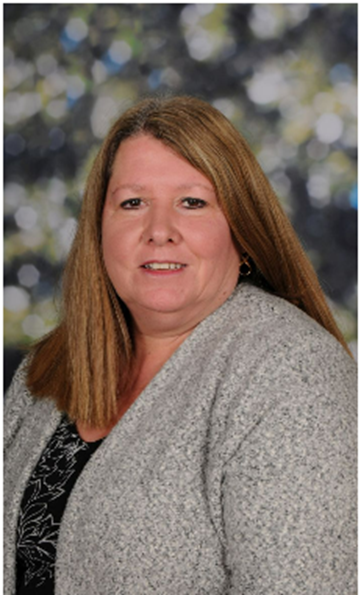
Mrs Smith - Class Teacher.
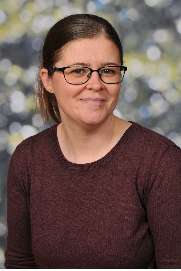
Mrs Massey - Learning Support
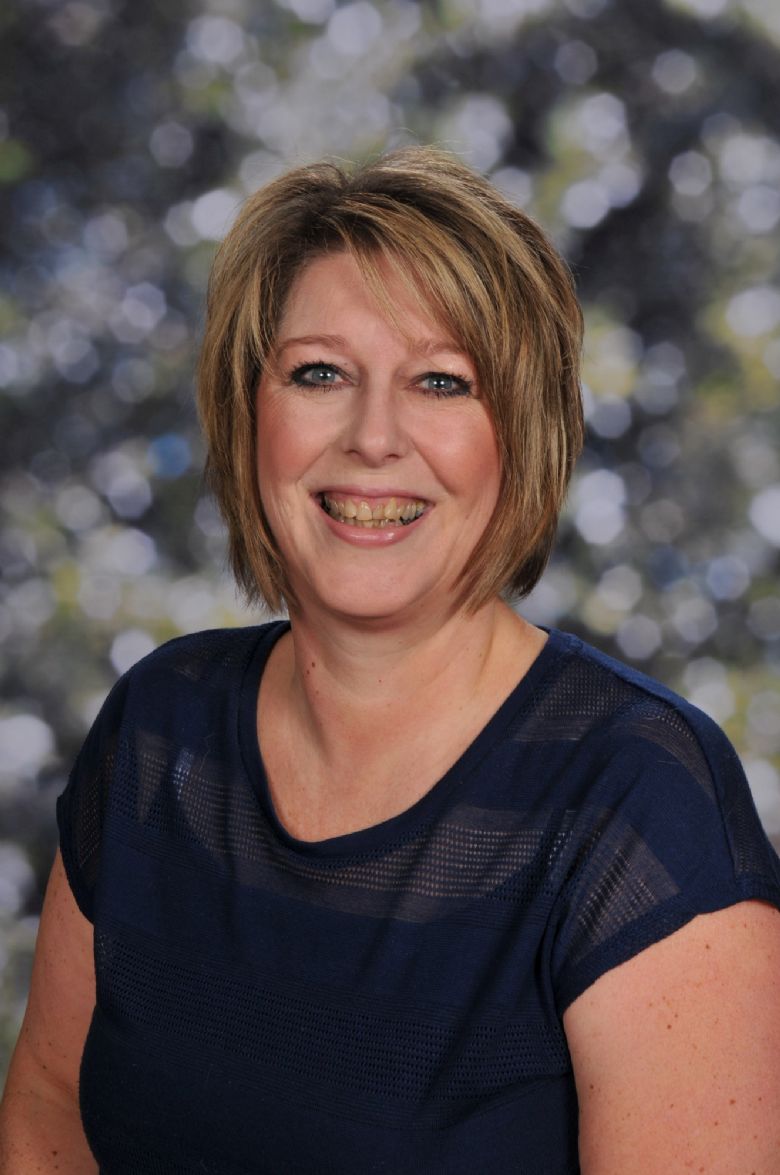
Mrs Whyle - HLTA
Covering the post of Class Teacher until July.
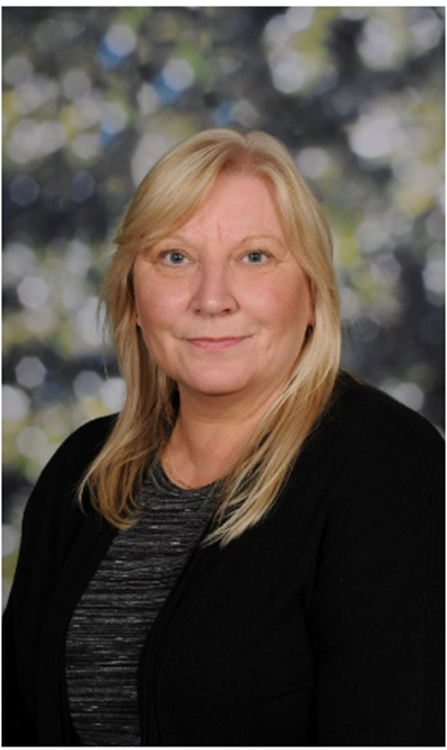
Mrs Bull - Learning Support
Year 4 class names and author link
Our Year 4 classes are named after Alan Ahlberg and Cressida Cowel.
Year 4 start and end of day handover information
The school day starts at 8:45am. Year 4 enter via the main entrance. A member of staff will always be available to receive any messages.
Year 4 are dismissed at the end of the day from the same door. We ask that parents form an orderly queue to ensure a safe handover.
Keeping Year 4 pupils safe
These are extracts from our Behaviour Policy.
Protective behaviours
We have a Protective Behaviours culture and children regularly identify and update their Network Hand. This ensures that children know which adults they can approach if they are worried, however ‘awful or small’.
Proactive social media reminders
We send regular and proactive reminders to parents regarding social media and always request you check pupil devices regularly and have full access to all their devices and accounts. By working together in this way we work towards keeping pupils safe.
Learning 4 Life
Our Learning for Life lessons allow us to be proactive with teaching children how to keep themselves safe, learn about relationships education, relationships and sex education and health education.
Year 4 curriculum overview
English Curriculum and key texts
We use key texts to motivate and engage learners. In Autumn term we focused on Floodland all related to the impact of global warming. In Spring term we read Spilled Water and learnt lots about the one child policy in China. In the Summer term our focus is on The Closest Thing to Flying.



Mathematics Curriculum
We have made a conscious decision to use White Rose as a product; however, we have created our own curriculum overview for Maths. Teachers will use this curriculum overview to deliver the majority of the units outlined within each strand, using White Rose as a supporting resource (example of the curriculum overview is below). As teachers follow the learning journey, pupils will experience mathematics through the CPA and Singapore Maths approach. This ensures that mathematics remains pictorial and enables pupils to use a variety of strategies to solve problems – thus removing barriers and ensuring mathematics is accessible to all. The curriculum has been specifically designed to give pupils the time to master each skill. Early mastery of skills is also encouraged, as skills from the following year group have been naturally linked to, which removes the ceiling on learning outcomes.
There are mathematical units that will be taught using a cross-curricular approach. Pupils should expect to be taught statistics and time through other areas of the curriculum, such as Geography and Science. This enables children to see that mathematics is not a stand-alone subject and has an impact within other subject areas. This also allows for more time within mathematics lessons to teach other units in greater detail and address any misconceptions or gaps in knowledge.
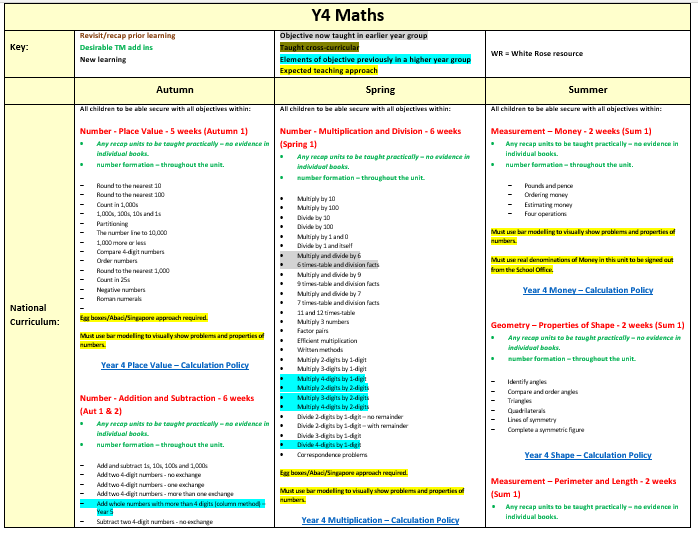
Curriculum subjects
|
Autumn term |
Spring Term |
Summer Term |
|||||
|
Art |
Printing |
Collage |
Sculpture |
||||
|
Computing |
4 Cowell |
4 Cowell |
4 Ahlberg |
||||
|
Design |
Construction inc textiles Create a freestanding bridge |
Mechanics including electricals Create a light up box |
Cooking and nutrition |
||||
|
Geography |
Uk and Planet Earth |
Europe including Russia |
Rivers |
||||
|
History |
|
|
Vikings |
||||
|
Learning for Life |
Proud to be me Protective Behaviours |
Fit for Life |
Perfect Planet |
||||
|
Modern Foreign Languages |
|
I can use colours in sentences
|
I can give opinions on fruit and vegetables. I can appreciate songs in Spanish I can understand feminine, masculine and neuter forms |
||||
|
Music |
4 Ahlberg will have |
4A will have Pbones in Spring 1, swapping to 4C in Spring 2. |
4A will have Pbones in Summer 1, swapping to 4C in Summer 2. |
||||
|
Physical Education |
Gymnastics |
Badminton Dance |
|||||
|
Religious Education |
|
|
What is it like to be a Hindu? Community, worship and celebration What are the deeper meanings of the festivals? |
||||
|
Science |
Animals including humans |
Electricity Sound |
States of Matter Animals including humans |
Preparing for the Multiplication Tables Check
During Year 4 there is a statutory Multiplication Tables Check set by the Department for Education. It is an on-screen check consisting of 25 times table questions. Your child will be able to answer 3 practice questions before taking the actual check. They will then have 6 seconds to answer each question. On average, the check should take no longer than 5 minutes to complete.
The purpose of the MTC is to determine whether pupils can recall their times tables fluently, which is essential for future success in mathematics. It will help schools to identify pupils who have not yet mastered their times tables, so that additional support can be provided.
To prepare the children for this check we have access to Times Table Rock Stars that we use frequently in school and the children also have access at home. Throughout the year we complete mock tests to identify the children who need more support to improve their score.
Transition into Year 4
During Year 4 there is a statutory Multiplication Tables Check set by the Department for Education. It is an on-screen check consisting of 25 times table questions. Your child will be able to answer 3 practice questions before taking the actual check. They will then have 6 seconds to answer each question. On average, the check should take no longer than 5 minutes to complete.
The purpose of the MTC is to determine whether pupils can recall their times tables fluently, which is essential for future success in mathematics. It will help schools to identify pupils who have not yet mastered their times tables, so that additional support can be provided.
To prepare the children for this check we have access to Times Table Rock Stars that we use frequently in school and the children also have access at home. Throughout the year we complete mock tests to identify the children who need more support to improve their score.
Year 4 Reading and home learning
As a school we follow the Little Wandle Letters and Sounds Revised scheme. If your child did not pass the Phonic screening test in Years 1 and 2, they will be in a Phonic catch up intervention. This means your child will bring home a reading Phonic practice book to match their reading level. Your child will be heard to read twice a week and a stamp will be given in their reading record to show this with their books being changed weekly.
Children who are not on Phonics will be given a book to match their reading age from our Nelson assessment. Again children will be heard read to read once a week and a stamp will be given in their reading record to show this with their books changed weekly.
If your child is reading their book with little help, please don't worry that it's too easy-your child needs to develop fluency and confidence in reading.
Listen to them read the book each night and write a comment in their reading record. Remember to give them lots of praise-celebrate their success. If they cannot read a word, read it to them. After they have finished, talk about the book together and use the questions and prompts in the back of the book.
If your child has a reading age of ten or above, they will get to choose a book from our free reader section from the school library. Children will be heard to read once every three weeks and will change their books.
All children are issued with an English and Maths homework book at the beginning of the year, each week they will be given a piece of English and Maths work to complete. We hand this out on a Friday and ask that it is completed for the following Wednesday.
Water bottles and snacks
Children should make sure they bring a reusable water bottle into school daily - this must only contain water. Children can make use of our water fountains to refill bottles.
We encourage healthy snacks for break time.
PE Days and Kit
Year 4's PE day is a Thursday.
P.E. Kit Reminder
- Black or navy shorts and a white t-shirt, or black or navy tracksuit bottoms and sweatshirts. Tracksuits must be plain and not have logos.
- Properly fitting black pumps or plimsolls.
- No jewellery to be worn.
- Everything should be labelled with child's name.
- P.E. kit should be in school every day.
Year 4 parental support and engagement
Throughout the year, the Year 4 teaching team will provide workshops to inform all Year 4 parents and carers about key events like the Multiplication Tables Check.
Support at home is a vital part of pupils achieving success.
How to support your child:
- Ensure your child has the best possible attendance at school.
- Support your child with the homework sent home.
- Regular times tables rehearsal in any context (Times Tables Rock Stars).
- Listen to your child read regularly and ask questions about the text.
- Talk to your child about what they have learnt at school and what book(s) they are reading (the character, the plot, their opinion).
- Make sure your child has a good sleep and healthy breakfast every morning.
How to support your child with writing:
- Encourage opportunities for writing such as letters to family or friends, shopping lists, notes or reminders, stories or poems.
- Write together.
- Encourage the use of a dictionary to check spelling and a thesaurus to find synonyms and expand vocabulary.
- Allow your child to use a computer for word processing, which will allow for editing and correcting of errors without lots of crossing out.
- Remember that good readers become good writers. Identify good writing features when reading (e.g. vocabulary, sentence structure, punctuation).
- Show your appreciation: praise and encourage, even for small successes